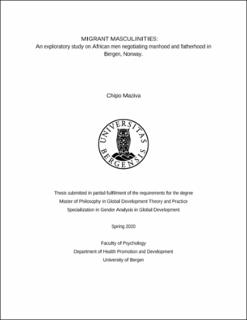| dc.description.abstract | Background Traditional migration research has predominantly focused on men and tends to examine men as non-gendered humans thus undermining the gendered dimensions of their experiences. While the impact of migration on gender identities and norms has been predominantly explored and understood from female migrants’ perspective, how migrant men negotiate their masculine identities in their host societies remains under researched. While masculinity studies have enjoyed considerable growth in the West, this study fills in the gap to address the dearth of research on transnational African fathers. Research Objectives In this study, I investigate the case of the transnational African fathers raising their children in Norway and how migration (re) defines their constructions of masculinity as men and as fathers. Given this context, I contribute to research on men and masculinities by investigating how the migratory experience challenges, modifies and reinforces conceptions of manhood and fatherhood. In the case of migrant men, this study did not merely examine the loss of patriarchal privileges to their female partners. Rather, it also explored the manner in which the construction of their male identity (manhood and fatherhood) is transformative. Data material and methods In this study, data was collected through semi structured interviews and observations with 11 African men. In some cases, personal photographs presented by participants during the interviews helped to generate more meaningful conversations pertaining to fundamental aspects of their sense of self and masculinity and the nature of fatherhood. The data was analyzed using Connell’s conceptualization of masculinities (e.g. 1995, 2005), Kimmel (1994, 2000) on manhood and masculinities, and the doing gender theory of Zimmerman and West (1987). Findings of Study There are multiple and situational ways of expressing, negotiating and enacting masculinities. Hence, whereas some men embodied patriarchal and emasculated masculinities, others engaged in non-violent and transformative masculinities. More significantly, some fathers embodied a hybrid masculine identity across situations. Rather than a homogenous and stable masculine identity, the construction of migrant masculine identity is a complex and contradictory process. The role of emotions in this study is profound given the intimate testimonies of these men regarding how they cope with their emotions to encounter the demands imposed and changes required of them by the people and cultures they encountered. Conclusions Because of pressures of masculinity, migrant men experience internal conflict and resultantly a sense of ‘double consciousness’ when they fail to fulfil cultural expectations regarding breadwinning which can result in feelings of inadequacy and guilt. Whilst paid work is a key element in conceptions of masculine self-hood in migrant men's lives, it can undermine an individual’s social roles and values. Furthermore, maintaining the dual role of ‘provider’ and 'nurturing caregiver’ is seemingly impossible and conflicting, as men tend to value engaging in the public sphere over preoccupation with domestic life. Though migration became an opportunity to assume bread winning, some men welcomed the opportunity to foster emotionally expressive and healthy relationships with their children and wives. This study contributes to the transnational migration research in these ways: examining the personal and emotive side of transnational migration by going beyond the examination of the loss of patriarchal privileges for men by also establishing the manner in which they consciously distance themselves from normative cultural ideals of what it means to be a man (manhood) and a father; and the multiplicity of masculinities among transnational migrant (African) men. | en_US |
